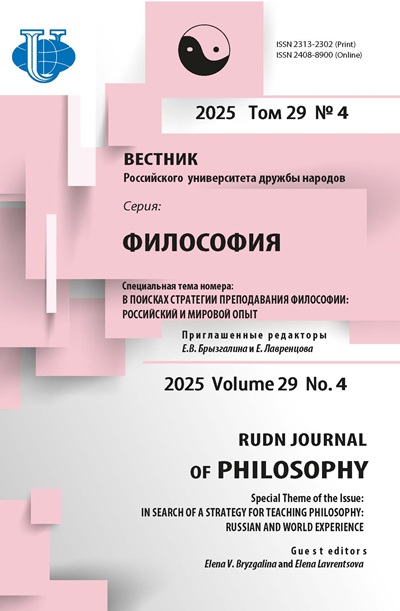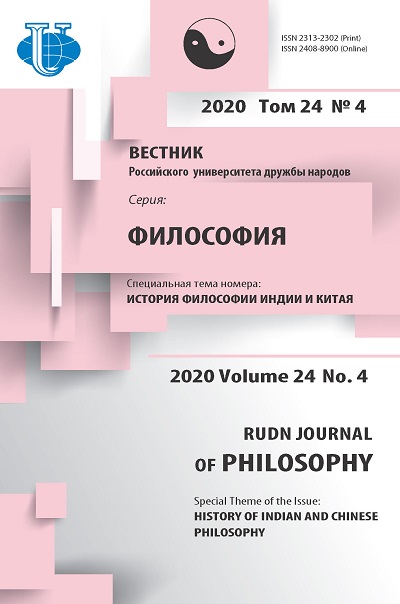Трактовка феноменов удрученности и умопомешательства в буддийских экзегетических источниках
- Авторы: Островская Е.П.1
-
Учреждения:
- Институт восточных рукописей РАН
- Выпуск: Том 24, № 4 (2020): ИСТОРИЯ ФИЛОСОФИИ ИНДИИ И КИТАЯ
- Страницы: 590-600
- Раздел: ИСТОРИЯ ФИЛОСОФИИ ИНДИИ И КИТАЯ
- URL: https://journals.rudn.ru/philosophy/article/view/25006
- DOI: https://doi.org/10.22363/2313-2302-2020-24-4-590-600
- ID: 25006
Цитировать
Полный текст
Аннотация
Статья посвящена рассмотрению морального аспекта интерпретаций феноменов удрученности (daurmanasya) и умопомешательства (cittavikщepa-unmāda) в трактатах «Абхидхармакошабхашья» Васубандху (IV-V вв.) и «Спхутартха абхидхармакошавьякхья» Яшомитры (VIII в.). Показано, что буддийская трактовка этих феноменов ментального страдания базируется на каноническом постулате: только телесное страдание является кармической ретрибуцией (vipāka-phala). Феномен удрученности трактуется буддийскими экзегетами как специфическое свойство воображения (kalpanā), проявляющееся в момент мыслительного конструирования нежелательных прожективных ситуаций. Удрученность может быть благой (kušala) или неблагой (akušala) в зависимости от моральной позиции личности. Благая удрученность есть сожаление (kaukçtya) о несовершенном добром деле или о содеянном прегрешении. Неблагая удрученность - ее противоположность. Умопомешательство трактуется как разрушение предикативной (abhinirūpana) и мнестической (anusmaraõa) функций сознания. Это ментальное страдание бывает кармически обусловленным в тех случаях, когда в прошлом совершались действия, представляющие собой покушение на чужое сознание. Кармической ретрибуцией в этих случаях является телесное страдание - нарушение равновесия великих
Об авторах
Елена Петровна Островская
Институт восточных рукописей РАН
Автор, ответственный за переписку.
Email: ost-alex@yandex.ru
доктор философских наук, профессор, главный научный сотрудник сектора Южной Азии отдела Центральной и Южной Азии
Российская Федерация, 191186, Санкт-Петербург, Дворцовая наб., 18Список литературы
- L’Abhidharmakoša de Vasubandhu. Traduit et annoté par Louis de la Vallée Poussin. 6 vols. Paris: Poul Geutner, 1923-1931.
- Sphuсārthā Abhidharmakošavyākhyā by Yašomitra. Ed. by Unrai Wogihara. Tokyo: The Publishing Association of Ahbidharmakošavyākhyā, 1932-1936.
- Васубандху. Энциклопедия Абхидхармы (Абхидхармакоша). Разделы I и II. Издание подгот. Е.П. Островская и В.И. Рудой. М.: Ладомир, 1998.
- Васубандху. Энциклопедия Абхидхармы (Абхидхармакоша). Разделы III и IV. Издание подгот. Е.П. Островская и В.И. Рудой. М.: Ладомир, 2001.
- Dhammajoti Bhikkhu K.L. Sarvāstivada Abhidharma. Hong Kong: Centre of Buddhist Studies, University of Hong Kong; 2009.
- Achaya K.T. Alcoholic fermentation and its products in Ancient India // Indian Journal of History of Science. 1991. 26(2). P. 123-129.
- Kritzer R. Vasubandhu and the Yogācārabhūmi: Yogācāra Elements in the Abhidharmakoša. Tokyo, 2005.
- Bayer A. The Theory of Karman in the Abhidharmasamuccaya. SPhB MS XXVI. Tokyo: The International Institute for Buddhist Studies, 2010.
- Dasgupta S.A. History of Indian Philosophy. Vol. II. Cambridge, 1961.
Дополнительные файлы















